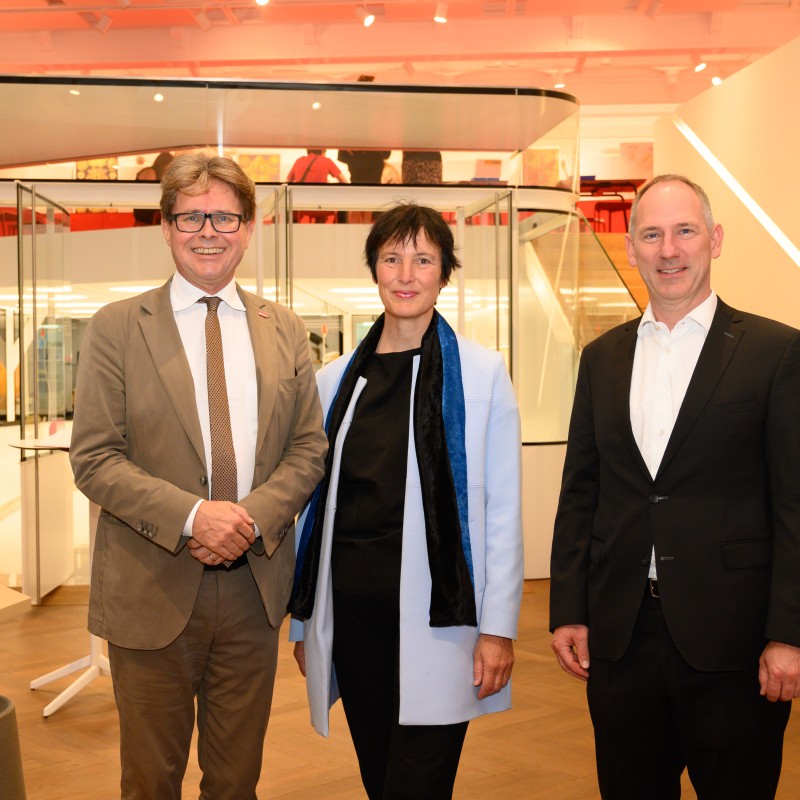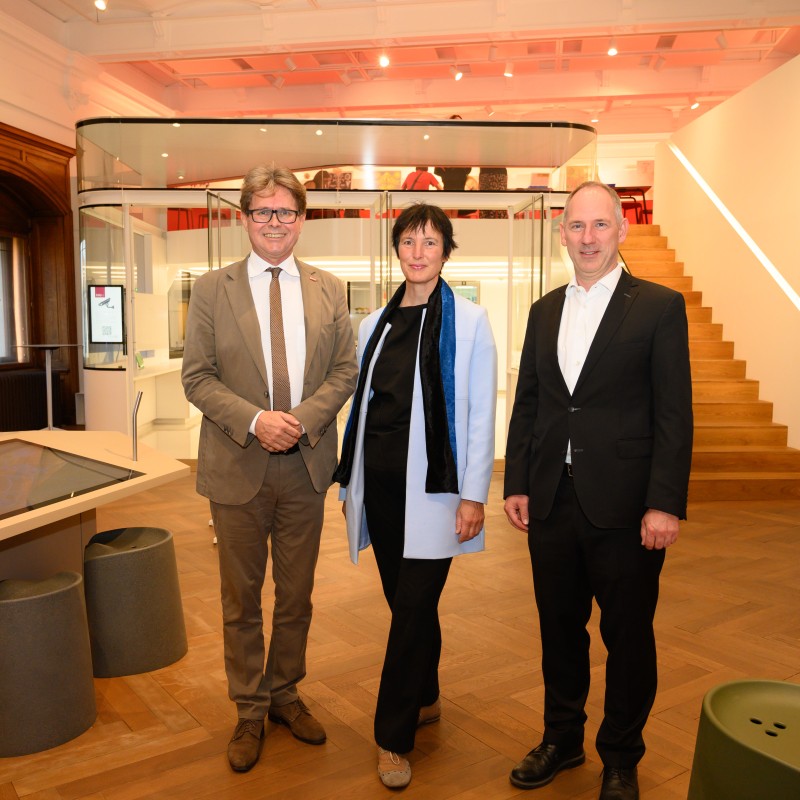NHM Vienna enjoys a visit of Science Minister Martin Polaschek
01. September 2022
On 1 September 2022, Prof. Dr. Martin Polaschek, Austrian Federal Minister of Education, Science and Research, visited the
Natural History Museum (NHM) Vienna and familiarised himself with the museum’s citizen science initiatives. In 2024, the NHM
Vienna and the University of Natural Resources and Applied Life Sciences (BOKU) will jointly organise Austria’s annual citizen
science conference, as well as a special international edition. The events will be funded by the Federal Ministry of Education,
Science and Research (BMBWF).
As one of Austria’s largest non-university research institutions, the NHM Vienna contributes
significantly to collection-based research. Its modern laboratory equipment and new methods of population genomics make the
museum a high-level research institution, and the proactive opening of the collections to research is another essential part
of the museum’s mission. As an important interface to society the museum communicates with the general public through its
exhibitions, the educational programmes and the opportunity for citizens to participate in research. These citizen science
activities constitute an important contribution to science.
On Thursday afternoon, Federal Minister Prof. Dr. Martin Polaschek visited the museum's Deck 50, a platform for science communication, and also met volunteers from the fields of entomology and geology. The Minister noted: “The Natural History Museum Vienna makes an important contribution to supporting innovation and enthusiasm for science in Austria. I am impressed by the diversity of groups that can enjoy the museum’s educational opportunities, from young children to extensive school programmes and senior citizens who do voluntary work in the collections.”
Citizen science plays an important role. Deck 50 – the space for science communication inaugurated in 2021 – is a vibrant venue that is constantly evolving on the basis of lively exchanges of ideas between museum staff and visitors, both in the “Getting to know diversity” programme, and also between external partners and the museum's research staff. Citizens are encouraged to participate in a variety of individual research projects conducted by the museum's scientists (involving, for instance, testing prehistoric weaving patterns, observing amphibians and reptiles, or searching for fossilised dinosaur tracks) and thus contribute to science insights, or lend a hand to the work of various departments of the museum onsite.
Dr Katrin Vohland, Director General of the NHM Vienna, was involved in the foundation of the European Citizen Science Association (ECSA), which will celebrate its 10th anniversary in 2024. She also headed a COST Action on scientific analysis led by Citizen Science (European Cooperation in Science and Technology). For this reason, Vohland is delighted about the good news from the ministry: “Together with the University of Natural Resources and Applied Life Sciences (BOKU), which runs the 'Österreich forscht' network, we have successfully applied to host the European Citizen Science Conference in Vienna in 2024. The Ministry of Research is supporting us in organising both a scientific conference and a citizen science festival flanking the conference.”
Citizen Science Conference:
In 2024, the international Citizen Science Conference will be held from 7 to 10 April. The NHM Vienna will organise a scientific conference and the accompanying festival jointly with the University of Natural Resources and Applied Life Sciences (BOKU).
The festival invites citizens to attend the conference free of charge: they will find ample opportunities to learn about citizen science and a variety of projects, try their hands at them and exchange ideas with researchers face to face. This one-day festival is accompanied by a supporting programme in the museum itself and at the museum’s environmental education centre in the Donauauen National Park (in Petronell).
On Thursday afternoon, Federal Minister Prof. Dr. Martin Polaschek visited the museum's Deck 50, a platform for science communication, and also met volunteers from the fields of entomology and geology. The Minister noted: “The Natural History Museum Vienna makes an important contribution to supporting innovation and enthusiasm for science in Austria. I am impressed by the diversity of groups that can enjoy the museum’s educational opportunities, from young children to extensive school programmes and senior citizens who do voluntary work in the collections.”
Citizen science plays an important role. Deck 50 – the space for science communication inaugurated in 2021 – is a vibrant venue that is constantly evolving on the basis of lively exchanges of ideas between museum staff and visitors, both in the “Getting to know diversity” programme, and also between external partners and the museum's research staff. Citizens are encouraged to participate in a variety of individual research projects conducted by the museum's scientists (involving, for instance, testing prehistoric weaving patterns, observing amphibians and reptiles, or searching for fossilised dinosaur tracks) and thus contribute to science insights, or lend a hand to the work of various departments of the museum onsite.
Dr Katrin Vohland, Director General of the NHM Vienna, was involved in the foundation of the European Citizen Science Association (ECSA), which will celebrate its 10th anniversary in 2024. She also headed a COST Action on scientific analysis led by Citizen Science (European Cooperation in Science and Technology). For this reason, Vohland is delighted about the good news from the ministry: “Together with the University of Natural Resources and Applied Life Sciences (BOKU), which runs the 'Österreich forscht' network, we have successfully applied to host the European Citizen Science Conference in Vienna in 2024. The Ministry of Research is supporting us in organising both a scientific conference and a citizen science festival flanking the conference.”
Citizen Science Conference:
In 2024, the international Citizen Science Conference will be held from 7 to 10 April. The NHM Vienna will organise a scientific conference and the accompanying festival jointly with the University of Natural Resources and Applied Life Sciences (BOKU).
The festival invites citizens to attend the conference free of charge: they will find ample opportunities to learn about citizen science and a variety of projects, try their hands at them and exchange ideas with researchers face to face. This one-day festival is accompanied by a supporting programme in the museum itself and at the museum’s environmental education centre in the Donauauen National Park (in Petronell).
Federal Minister Prof. Dr. Martin Polaschek , NHM Vienna-Director General
Dr. Katrin Vohland, CFO Mag. Markus Roboch
(c) NHM Wien, Christina Rittmannsperger






